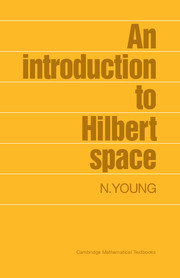Book contents
- Frontmatter
- Contents
- Foreword
- Introduction
- 1 Inner product spaces
- 2 Normed spaces
- 3 Hilbert and Banach spaces
- 4 Orthogonal expansions
- 5 Classical Fourier series
- 6 Dual spaces
- 7 Linear operators
- 8 Compact operators
- 9 Sturm–Liouville systems
- 10 Green's functions
- 11 Eigenfunction expansions
- 12 Positive operators and contractions
- 13 Hardy spaces
- 14 Interlude: complex analysis and operators in engineering
- 15 Approximation by analytic functions
- 16 Approximation by meromorphic functions
- Appendix: square roots of positive operators
- References
- Answers to selected problems
- Afterword
- Index of notation
- Subject index
- Frontmatter
- Contents
- Foreword
- Introduction
- 1 Inner product spaces
- 2 Normed spaces
- 3 Hilbert and Banach spaces
- 4 Orthogonal expansions
- 5 Classical Fourier series
- 6 Dual spaces
- 7 Linear operators
- 8 Compact operators
- 9 Sturm–Liouville systems
- 10 Green's functions
- 11 Eigenfunction expansions
- 12 Positive operators and contractions
- 13 Hardy spaces
- 14 Interlude: complex analysis and operators in engineering
- 15 Approximation by analytic functions
- 16 Approximation by meromorphic functions
- Appendix: square roots of positive operators
- References
- Answers to selected problems
- Afterword
- Index of notation
- Subject index
Summary
There is no shortage of essential uses of Hilbert space theory in mathematics and in pure and applied science, but setting up the background for any of them is lengthy. We shall content ourselves with two applications which illustrate Hilbert spaces in action in mainstream mathematics and also in science and engineering. In the next three chapters we shall develop the mathematical theory which justifies the method of ‘separation of variables’. This is one of the commonest approaches to the solution of linear partial differential equations, and is in routine use by scientists and working engineers. The topic thus has practical importance, and it also has historical significance since it was from the study of the differential and integral equations associated with such problems that functional analysis emerged.
Sturm–Liouville systems are second-order linear differential equations with boundary conditions of a particular type, and they usually arise from separation of variables in partial differential equations which represent physical systems. As an illustration we analyse small planar oscillations of a hanging chain.
Small oscillations of a hanging chain
A uniform heavy flexible chain of length L is freely suspended at one end and hangs under gravity. The chain is displaced slightly, in a vertical plane, and released from rest. The problem is to describe the subsequent motion of the chain. We are really concerned here with the mathematical analysis which is required, but for completeness let us give a brief heuristic derivation of the governing equations.
Information
- Type
- Chapter
- Information
- An Introduction to Hilbert Space , pp. 105 - 118Publisher: Cambridge University PressPrint publication year: 1988
